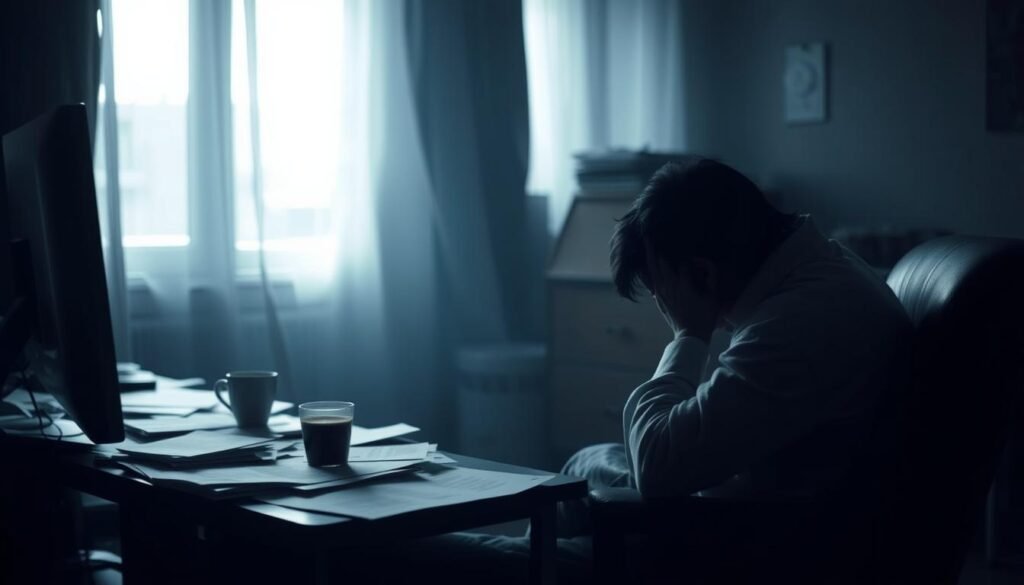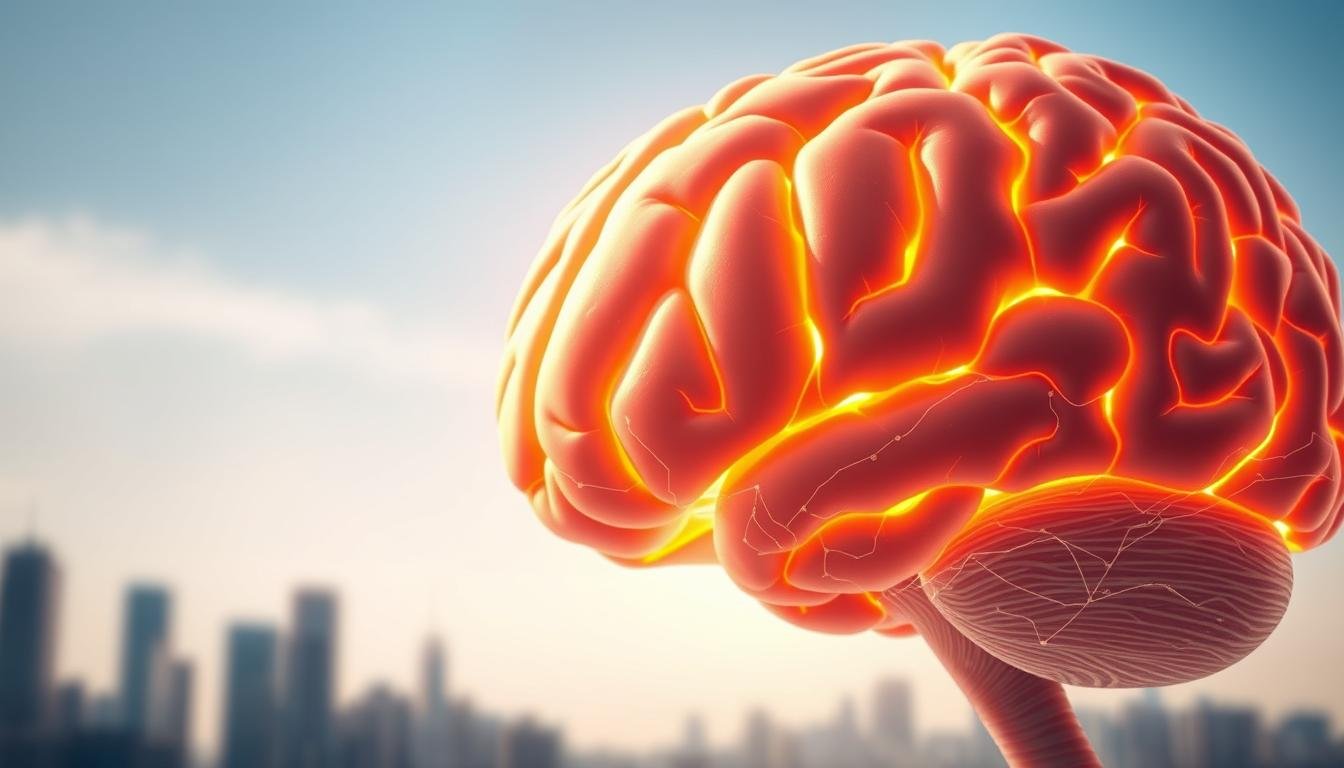In today’s fast-paced world, many people feel mentally exhausted. It’s important to know the signs of mental exhaustion. These signs can affect how well you function and feel every day.
When you’re mentally exhausted, simple tasks can seem impossible. It’s key to understand and manage mental exhaustion to stay well. By spotting early signs, you can start to feel better and stay emotionally and mentally healthy.
Key Takeaways
- Mental exhaustion can affect productivity and well-being.
- Recognizing signs early is vital for effective recovery.
- Understanding mental exhaustion symptoms is the first step.
- Implementing recovery strategies is essential for mental health.
- Adopting a proactive approach helps maintain mental wellness.
Understanding Mental Exhaustion
Mental exhaustion is a state of deep emotional, physical, and mental tiredness. It comes from being stressed for a long time. Unlike regular stress, mental exhaustion grows slowly and can really affect how we live our daily lives. It’s important to know the signs of mental burnout to start recovering.
What Is Mental Exhaustion?
Mental exhaustion makes you feel too tired to do things you normally enjoy. You might feel constantly fatigued, struggle to focus, and get easily annoyed. Recognizing these symptoms is the first step to getting better.
Causes of Mental Exhaustion
There are many reasons for mental exhaustion, like constant stress at work, in personal relationships, or during big life changes. Each one adds to feeling drained. Using the right strategies to recover from mental fatigue can help. Knowing what stresses you out is key to dealing with mental exhaustion.
Common Signs of Mental Exhaustion
It’s important to know the signs of mental exhaustion to take care of your mental health. Spotting these signs helps you act quickly. Feeling constantly tired and lacking energy makes it hard to do everyday things.
Persistent Fatigue and Low Energy
Feeling tired all the time and lacking energy is a big sign. This can make you less motivated and less productive. It can make simple tasks hard, leading to more frustration and feeling helpless.
Seeing these signs means it’s time to find ways to recover your mental health.
Difficulty Concentrating
Having trouble focusing is another sign of mental exhaustion. It can cause mistakes in work or at home, hurting your performance. This can make you feel like you’re not doing well, adding to stress and the need for recovery strategies.
Increased Irritability
Feeling more irritable is also a sign. You might get annoyed easily, affecting your relationships. This can lead to arguments and feeling alone, making recovery harder.
Emotional Symptoms of Mental Exhaustion
It’s important to know the emotional signs of mental exhaustion. Many people feel cynical, which can make them see work and life in a negative light. This feeling makes it hard to find joy in everyday tasks.
Anxiety and feeling overwhelmed can make these feelings worse. It’s hard to manage tasks when you’re feeling this way.
Feelings of Cynicism
Cynicism makes you doubt others’ intentions or lose interest in things you once enjoyed. It can lead to constant negativity, affecting both personal and work relationships. It’s hard to work together when you feel this way.
This can hurt team spirit and lower productivity.
Anxiety and Overwhelm
Anxiety and feeling overwhelmed make it tough to deal with stress. These feelings can pop up without warning and lead to a downward spiral. It’s hard to focus on simple tasks when you’re feeling this way.
These symptoms can make mental exhaustion worse. Recognizing them is the first step to getting better.
Physical Manifestations of Mental Exhaustion
Mental exhaustion shows up in many ways, not just in our minds. It’s important to notice these signs to tackle the root problems. Symptoms of mental fatigue can really affect our daily lives. So, finding good ways to recover is key.
Sleep Disturbances
Insomnia or sleeping too much are common signs of mental exhaustion. These issues can mess up our sleep patterns, making fatigue worse. To improve sleep, we need a calm environment, relaxation techniques, and a regular sleep schedule.
Understanding how mental exhaustion affects sleep helps us find our own recovery paths.
Headaches and Muscle Tension
Stress from mental fatigue often causes headaches and muscle tension. Our body’s stress response can make muscles tight, leading to pain and distraction. To fight this, we can try relaxation exercises, stretches, and staying hydrated.
Knowing these signs helps us take action and improve our overall health.
Behavioral Changes Indicating Exhaustion
It’s key to spot behavioral changes to know if someone is burned out. When stress and fatigue rise, how we react to everyday life changes. Not wanting to be around others and changes in how much we eat are big signs.
Withdrawal from Social Activities
People feeling burned out might pull away from friends and family. They might feel too overwhelmed or just want to avoid hard conversations. This can lead to feeling lonely and isolated, making emotional struggles worse.
Seeing this change is important. It shows someone might need help to feel better.
Changes in Appetite
Feeling burned out can also mess with our eating habits. We might want comfort foods more or lose interest in eating. These changes show how our emotions are tied to our health.
Noticing these changes is crucial. It helps us see when we might need professional help.
| Behavioral Change | Impact on Mental Health |
|---|---|
| Withdrawal from Social Activities | Increased feelings of loneliness and isolation |
| Changes in Appetite | Potential weight gain or loss, indicating emotional distress |
The Impact of Mental Exhaustion on Daily Life

Mental exhaustion can really mess up your daily life, especially at work and in personal relationships. It can make you perform worse at work, which slows down your productivity. This can also hurt your personal life, making it harder to get along with family and friends.
Work Performance Decline
When you’re mentally tired, you might find it hard to focus and stay motivated at work. You might miss deadlines or make mistakes in your tasks. This is because it’s tough to think clearly and solve problems when you’re exhausted.
Even simple jobs can seem overwhelming, which can make your job performance suffer.
Relationships and Family Life
Mental exhaustion can also hurt your personal relationships. It can make you short-tempered and withdrawn, leading to communication problems. This can make it hard to connect with your family and friends.
It’s important to notice these signs and try to find ways to deal with them. This can help keep your relationships strong.
| Aspect | Effect of Mental Exhaustion | Signs of Mental Exhaustion |
|---|---|---|
| Work Performance | Decreased productivity, missed deadlines | Lack of focus, increased errors rate |
| Relationships | Emotional disconnection, communication breakdown | Feelings of irritability, withdrawal from social interactions |
Identifying Personal Triggers
It’s crucial to know what causes mental exhaustion. Finding out what leads to it helps people create plans to feel better. Work stress and big life changes are two main reasons.
Work-related Stress
Work can be very stressful, especially with tight deadlines. Things like a heavy workload, not enough support, and feeling out of control are common stressors. Knowing these can help you find ways to deal with them.
Life Transitions
Big changes in life, like moving or getting a new job, can be tough. They make you feel unsure and unstable. Adjusting to new places, making friends, and handling more tasks are key challenges.
Understanding these moments helps you tackle your mental health. It lets you make plans that fit your situation.
Strategies for Recovery
Recovering from mental exhaustion needs a careful plan that focuses on rest and mental wellness. Getting enough sleep is key to clear thinking and better emotional health. Using relaxation methods helps people focus again.
Prioritizing Rest and Sleep
Good sleep is essential for mental health. A regular sleep schedule and a soothing bedtime routine help a lot. Avoiding screens before bed and keeping your sleep area comfy also helps.
These steps help manage stress and give you more energy for daily tasks.
Mindfulness and Meditation Techniques
Mindfulness and meditation are important for getting over mental exhaustion. Mindful breathing and guided meditations help people feel calm and peaceful. Even a few minutes a day can make a big difference in mental health.
Healthy Coping Mechanisms

It’s crucial to find good ways to cope with mental exhaustion. Regular exercise boosts mood and helps fight stress. Having a support network is also key, offering understanding and encouragement.
Physical Exercise
Exercise is great for both body and mind. Activities like jogging, swimming, or yoga release endorphins, making us feel better. These “feel-good” hormones help improve mood and reduce stress and anxiety.
Building a Support Network
A strong support network is vital for mental health. Friends, family, or professionals can offer much-needed support. Sharing experiences and getting emotional support are important for feeling better.
Professional Help Options
When you can’t beat mental exhaustion on your own, it’s time to get help. Therapy is a big support during recovery. It lets you tackle your problems in a safe way. Knowing when to get therapy and who to see is key.
When to Seek Therapy
There are clear signs you need professional help. If you’re tired all the time and can’t shake it off, or if your emotions mess up your day, it’s time to seek help. Other signs include:
- Struggling to do everyday tasks.
- Feeling hopeless or anxious all the time.
- Having trouble with friends and family because of your mood.
Types of Professionals to Consider
There are many experts in mental health, each with their own way of helping. You can pick the one that fits your needs best. Here are some options:
| Professional Type | Description | Focus Areas |
|---|---|---|
| Psychologist | Offers therapy in many ways, like cognitive-behavioral therapy. | Emotional health, coping, and relationships. |
| Counselor | Helps with specific life areas, focusing on changing behaviors and growing. | Dealing with loss, managing stress, and handling life changes. |
| Life Coach | Guides you to set and reach personal goals, helping you live a fulfilling life. | Setting goals, staying motivated, and career growth. |
Developing a Long-term Wellness Plan
Creating a long-term wellness plan is key to managing mental exhaustion. It helps you focus on self-care while handling your duties. This way, you can live a more fulfilling life and boost your overall well-being.
Creating a Balanced Routine
Making a balanced routine means mixing work, fun, and self-care. A good daily plan stops exhaustion and supports mental health. Here’s what to include in your routine:
- Designate specific time blocks for work, relaxation, and hobbies.
- Incorporate regular physical activity to boost energy levels and improve focus.
- Allow time for creative pursuits that foster joy and relaxation.
Setting Boundaries
Setting boundaries is vital to avoid burnout. Clear limits help manage time and energy. Here are tips for setting good boundaries:
- Communicate assertively with colleagues and family about your schedule.
- Learn to say no to tasks that cause stress.
- Prioritize time for yourself without feeling guilty for not being available.
Conclusion: Embracing Self-Care
Understanding the importance of self-care is key to avoiding and recovering from mental exhaustion. Life’s demands can push us too far, making it crucial to know our limits. By recognizing when we’re feeling overwhelmed, we can take steps to recharge and keep our mental health strong.
Recognizing Your Limits
Accepting our limits is a big step towards lasting wellness. It’s important to listen to our body and mind. Ignoring stress signs can lead to burnout.
By acknowledging our feelings and needs, we empower ourselves to live a healthier life. This self-awareness is the first step in preventing mental exhaustion.
Committing to Ongoing Wellness
Wellness is a journey, not a one-time choice. It involves making self-care a regular part of our lives. Activities like meditation, exercise, or spending time with loved ones help keep our mental health in check.
Regularly checking and adjusting our self-care practices is also key. It helps us manage stress and live a more fulfilling life.



